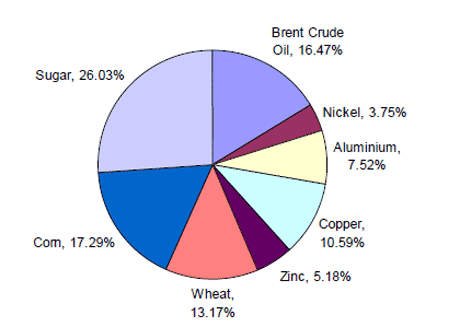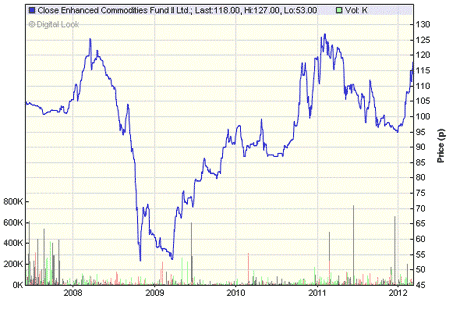The bull market ruse that could destroy your investment
Buying exposure to agricultural commodities on the futures market can be a risky strategy, says Bengt Saelensminde. Here, he tips a far safer way to profit.
Get the latest financial news, insights and expert analysis from our award-winning MoneyWeek team, to help you understand what really matters when it comes to your finances.
You are now subscribed
Your newsletter sign-up was successful
Want to add more newsletters?

Twice daily
MoneyWeek
Get the latest financial news, insights and expert analysis from our award-winning MoneyWeek team, to help you understand what really matters when it comes to your finances.

Four times a week
Look After My Bills
Sign up to our free money-saving newsletter, filled with the latest news and expert advice to help you find the best tips and deals for managing your bills. Start saving today!
What's worse than spotting a great bull market and not putting your money down?
I'll tell you. Spotting a great bull market, putting your money down and then losing cash on the deal!
Many investors spotted the great bull run in agricultural commodities, put their money down, and then failed to make a bean out of it. Worse some even lost money.
MoneyWeek
Subscribe to MoneyWeek today and get your first six magazine issues absolutely FREE

Sign up to Money Morning
Don't miss the latest investment and personal finances news, market analysis, plus money-saving tips with our free twice-daily newsletter
Don't miss the latest investment and personal finances news, market analysis, plus money-saving tips with our free twice-daily newsletter
On Wednesday I gave you my reasons why I think commodities are set to run and run. I'm especially bullish about food stuffs. But you need to be careful here.
Because the truth is that during these bull runs, the market has a habit of plucking profits from ill-informed investors. There is always a ruse to exploit those who are coming late to the story. And that is certainly the case in this market.
Today I want to talk about how I think you can avoid this ruse. I'll explain how banks are pitching products to retail investors that could prove a complete disaster.And I'll point to what I believe is the best way to build investment gains through agricultural commodities in the years ahead.
Beware the futures markets
If you buy into a fund that purports to give you exposure to agricultural commodities, then you've got to understand what you're getting into.
These funds don't tend to buy and hold physical stock. I mean, how can they? This isn't copper, or gold; these are foodstuffs. They have a nasty tendency of going off if you just sit on them.
So funds (especially exchange-traded funds(ETFs)) that promise to give you exposure to an index of agricultural food crops are likely to be synthetically' created in the paper market. That is, the futures markets.
Take a wheat future for example...

The ETF manager wants some exposure to the ups and downs of wheat, so he buys a contract for wheat with delivery in December. Now because the ETF doesn't want to take physical delivery, it'll sell the contract just before it expires. I mean you can imagine the commotion if a ten-ton truck turned up at the Gherkin with a delivery of wheat for Mr Pinstripe!
Instead, with the proceeds of the sale of his December contract, he buys a new contract with delivery the following June.
But there's a problem. Generally, future contracts are more expensive than expiring ones; a phenomenon called contango. This premium reflects storage and financing costs and perhaps how traders are feeling about future wheat production.
Now selling a cheap contract and buying an expensive one is obviously bad business. Even if the wheat price moves up, the ETF can move down! This is a disaster area. In my opinion, the banks shouldn't be allowed to market these sorts of things as ETFs. At all.
I'm not saying the futures markets aren't a great thing. They most definitely are. They enable producers to forward-sell' production and lock-in prices for his December's harvest. And speculators (I struggle to call them investors) help create a market price that guides future production.
But this is no market for long-term investment. The odds are stacked against you.
A better way to play it
I've written about my favourite way to play the commodities market in the past. It's the Close Brothers Enhanced Commodities Trust.
It's an investment trust that was launched in 2007 to get exposure toeight commodities. In 2013, the trust will be wound up and deliver gains (losses) to its shareholders.
This is an investment in commodities that really is genuinely aimed at serious investors. In 2007, Close took a basket ofeight commodities and noted their current market price. Management then struck a deal with some counterparties (banks) along these lines: "We'll give you £45m now and in return, you give us our £45m back insix years time. Oh and you can also give us twice the uplift in this basket ofeight commodities!"
And the banks went for it. If you want a fuller explanation click here.
The following chart shows the eight commodities. Now bear in mind when the fund launched, it had an equal weighting (12.5%) in each of the commodities.
But just take a look at how it's all changed (as at Dec '11). Wheat, corn and crude oil now make up more than half the portfolio.

Source: Half Yearly Financial Report (to end December 2011)
And you thought that it was oil that was flying... just look at sugar. Sugar is in fact, up 174% since the fund launched in 2007.
There could be some more fun and games to come before this investment trust is wound up...
The fund may be nearing its end but not necessarily the fun!
The fund launched with a six year lifespan. And now there's just over one year left to run.
But that doesn't necessarily mean there's no profit left. In fact, it could be quite the opposite, as at the end of February, the overall increase in the commodities basket was 31%. And because the investors are due twice that uplift, it converts to a 62p payment per share (plus the original £1 stake). So if the value of the commodities basket remains the same, investors get £1.62 back.
And yet you can currently buy this stock for £1.18!
That seems a great deal. And if anything, I'm expecting the value of these commodities to rise even further from here.
If I'm wrong and the commodities come back down, then the fund is structured to still pay investors £1 per share back. Of course, considering the current price, this means if the price of some or all of the commodities plummets you could lose money on your investment.
But there's a potential problem to keep an eye on...
I mentioned earlier that this investment is built upon the understanding that the five counterparties (banks) will stick to their end of the bargain.
Each of the five banks are supposed to pay investors back £1 per share plus any increase in the value of the commodities. Here are the details of the banks and how much they're in for:
| Caisse Centrale du Credit Immobilier de France 0% EMTN 14 June 2013 | 9,050,000 | 12,540,279 |
| Erste Bank 0% EMTN 14 June 2013 | 9,050,000 | 12,184,020 |
| Irish Life & Permanent plc 0% EMTN 14 June 2013 | 9,050,000 | 9,324,706 |
| Mediobanca SpA 0% EMTN 14 June 2013 | 9,050,000 | 11,895,062 |
| SNS Bank NV 0% EMTN 14 June 2013 | 9,050,000 | 12,194,920 |
| Row 5 - Cell 0 | 45,250,000 | 58,138,987 |
The nominal holdings' represents the straight' value of the bonds close holds (when redeemed in 2013 it's what should give investors £1 back for each share). The valuation' includes the uplift from the commodities basket. These figures are taken from the interim accounts at end of December.
Now you know that I'm not a big fan of the banking sector. Especially in Europe. And what we've got here is a big fat wad of European bank bonds that basically stand behind this investment trust.
But at least the December accounts state that "...four out of five issuers carried an investment grade credit rating".
Basically one of the banks, Irish Life & Permanent was downgraded in December to below investment grade. You should also note that SNS bank has been downgraded (though it's still investment grade).
The bonds look okay for the moment. But obviously I've got concerns about these banks (and bonds). A blow-up in Europe could mean trouble.
The way I see it, this is a trade that's all to do with timing. Specifically June 2013. That's when investors cash in the bonds and any profits due.
Though I'm confident that there's going to be trouble in Europe, I'm equally confident that the authoritarians will do everything they can to keep the system together. To my mind, they've got firepower to keep the jig running until well after mid 2013.
Sure we'll see trouble in the interim, but we already know what the authorities will do. That is print money and try tokeep the system solvent (that's why you also need your gold!).
That should keep commodities buoyant. And I think it will keep our bonds in-the-money long enough for us to cash in some serious returns.

Source: Half Yearly Financial Report (to end December 2011)
Share performance since launch (September 2007): | 2007 +2.16% | 2008 -42.65% | 2009 +55.37% | 2010 +26.06% | 2011 -19.83%
This article is taken from the free investment email The Right side. Sign up to The Right Side here.
Important Information
Your capital is at risk when you invest in shares - you can lose some or all of your money, so never risk more than you can afford to lose. Always seek personal advice if you are unsure about the suitability of any investment. Past performance and forecasts are not reliable indicators of future results. Commissions, fees and other charges can reduce returns from investments. Profits from share dealing are a form of income and subject to taxation. Tax treatment depends on individual circumstances and may be subject to change in the future. Please note that there will be no follow up to recommendations in The Right Side.
Managing Editor: Frank Hemsley. The Right Side is a regulated product issued by Fleet Street Publications Ltd.
Fleet Street Publications Ltd is authorised and regulated by the Financial Services Authority. FSA No 115234. https://www.fsa.gov.uk/register/home.do
Get the latest financial news, insights and expert analysis from our award-winning MoneyWeek team, to help you understand what really matters when it comes to your finances.
Bengt graduated from Reading University in 1994 and followed up with a master's degree in business economics.
He started stock market investing at the age of 13, and this eventually led to a job in the City of London in 1995. He started on a bond desk at Cantor Fitzgerald and ended up running a desk at stockbroker's Cazenove.
Bengt left the City in 2000 to start up his own import and beauty products business which he still runs today.
-
 The downfall of Peter Mandelson
The downfall of Peter MandelsonPeter Mandelson is used to penning resignation statements, but his latest might well be his last. He might even face time in prison.
-
 Default pension funds: what’s in your workplace pension?
Default pension funds: what’s in your workplace pension?Default pension funds will often not be the best option for young savers or experienced investors